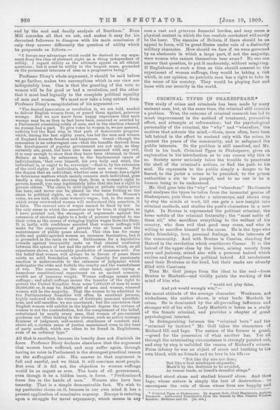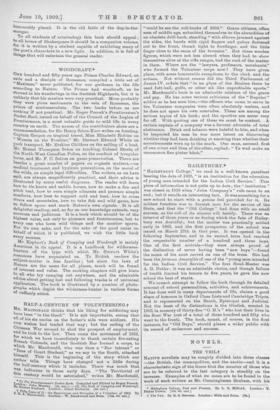CRIMINAL TYPES 1$ SHAKESPEARE.*
THE study of crime and criminals has been made by many eminent men, but, at the same time, the criminal still remnias a problem. True, the outcome of criminal research has led to much improvement in the method of treatnient,'Preventive effort, and attempts at reformation; but the psychological personality of the criminal, the " why " and "wherefore," the motives that actuate the mind,—these, more often, have been left behind in the effort to contend only with the crime, to protect the peace of the community, and to safeguard the public interests. So the problem is still unsolved, and Mr. Goll in his book, Criminal Types in Shakespeare, gives an explanation in his introduction as to one reason why this is so. Society never seriously takes the trouble to penetrate the shell of the criminal's actions, or find the path to his soul. He represents to the public simply a danger to be feared, to the jurist a crime to be punished, to the prison
authorities a sin to be purged, and to no one is he a human being to be understood.
Mr. Goll goes into the "why" and "wherefore." He dissects and analyses the types he takes from the immortal genius of Shakespeare, puts them under a microscope, and shows step by step the minds at work, till one gets a new insight into criminal methods, and studies the poet's characters in a new light. In Brutus is represented the political criminal, the home nobilis of the criminal fraternity; the "most noble of them all," who sacrifices everything to the welfare of his country, who does evil that good may come, and who is willing to sacrifice himself to the cause. He is the type who sinks friendship, love, personal feelings, in the interests of the community. And with Brutus is Cassius, standing for Hatred in the revolution which overthrows Caesar. It is the hatred of the upper class by the lower, arising merely from envy and jealousy, mixed also with a personal hatred which excites and strengthens his political hatred. All revolutions need their Brutuses at the head, but their ranks are already filled with Cassinses.
Then Mr. Goll jumps from the ideal to the real—from
Brutus to Macbeth—and vividly paints the working of the mind of him who " would not play false,
And yet would wrongly win,"—
the moral attitude of the average character. Weakness, not wickedness, the author shows, is what leads Macbeth to crime. He is dominated by the all-pervading influence and stronger will of his wife. Lady Macbeth is taken as a study of the female criminal, and provides a chapter of great psychological .interest.
In distinguishing between the "criminal born" and the "criminal by instinct" Mr. Goll takes the characters of Richard III. and Ingo. The nature of the former is greed, —greed for the possession of what another has. Yet all through the extenuating circumstance is strongly pointed out; and step by step is unfolded the reason of Richard's crimes. From infancy ho was an object of scorn and loathing to his own blood, with no friends and no love in his life :—
"Not like thy sire nor dam; But like a foul misshapen stigmatic,' Mark'd by the destinies to bo avoided, 'As venom toads, or lizard's dreadful stings."
Richard stood alone and studied himself alone. And then Iago, whose nature is simply the lust of destruction : to encompass the ruin of those whose lives are happily and
• Criminal Types in Shakespeare. By August Gall, Chief Magistrate, Aarhus, Denmark, Authorised Translation from the Danish by Mrs. Charles Week** London: Methuen and Co. De. net.] honourably placed. It is the old fable of the dog-in-the- manger.
To all students of criminology this book should appeal ; to all lovers of Shakespeare it should be a companion volume, for it is written by a student capable of exhibiting many of the poet's characters in a new light. In addition, it is full of things that will entertain the general reader.











































 Previous page
Previous page